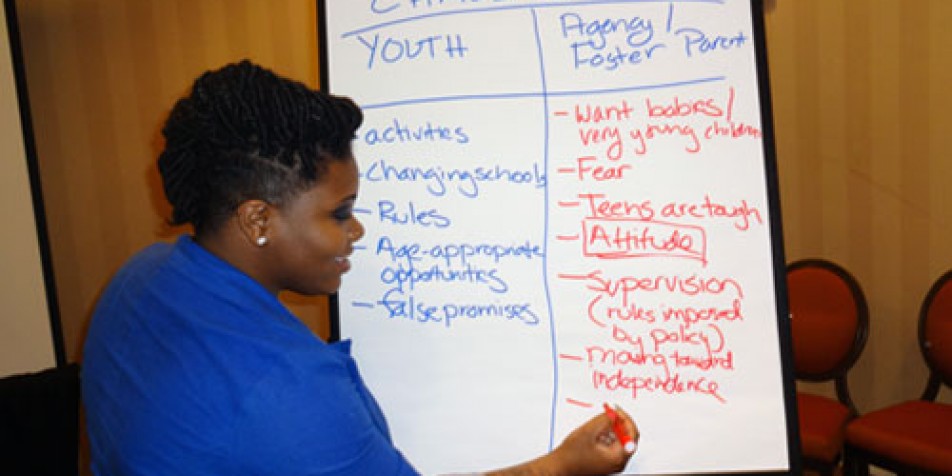Youth Engagement is Critical to Shaping Child Welfare Laws and Policies That Really Work

Above: Youth Fostering Change member Megan speaks about the youth-developed Teen Success Agreement at Pennsylvania Council of Children, Youth and Family Services's April 2013 conference
"Nothing about us without us" is an important slogan of foster youth everywhere who work to improve the child welfare system. These youth work hard to ensure that their voices are heard as they plan for their futures and their transitions from foster care.
It is a simple and straightforward message: policies and practices of the child welfare system must be informed by the voices of those most affected by it. Children taken into the child welfare system depend on it for their safety, the meeting of their basic needs, the services their families receive, and opportunities for their futures. Common sense requires that we listen to these youth, who have the most direct knowledge of the system and are most invested in its improvement.
Experience and research show that we have a better chance of ending up with policies that advance good practice when we listen to youth in foster care, and to foster youth alumni, about what works and what does not work. In addition to creating better policies, youth benefit from the experience of advocating for themselves and seeing that their voice is important.
National Foster Care Month reminds us to do more than merely think about youth in care. We must also listen to them in the many spheres that affect their lives—from individual case planning to making laws and policies. Adults working with foster youth must support the development of the skills they need to lead in their own cases and transition planning, and campaigns for law and policy reform.
You can support this work! Find out more about the importance of youth voice in improving the foster care system:
- To see examples of youth engagement in policy reform, see the exciting work of our Youth Fostering Change program.
- California Youth Connection (CYC) is a great example of an organization that is a leader in child welfare reform. CYC is led and staffed by current and former foster youth. CYC played a key leadership role in the passage of AB 12, California's law that extended foster care for youth until age 21. CYC continues to play an active role in influencing law and child welfare practice by making sure proposals are informed by the experience and aspirations of youth.
- Another powerful example of an organization that promotes youth engagement at all levels is the Jim Casey Youth Opportunities Initiative. This month, youth leaders are in the forefront as the organization kicks off its "Success Beyond 18" campaign. View the youths' presentation at the May 6 campaign kick-off at the U.S. Capitol.
- Fosterclub is a wonderful organization that works to develop current and former foster youth as leaders in child welfare reform and as leaders who educate their peers. Fosterclub provides many opportuntiies for youth and those working with them to develop their skills. Its website provides numerous tools for youth and those working with them to support youths' development of leadership skills.
- Find out about Youth Boards that work on foster care issues.
Finally, one of the best ways you can support the development of youth voice and leadership is by becoming a foster parent or mentor to a foster youth. Developing a supportive relationship with youths, listening to them, and helping them plan for the future is a great way to ensure that youth will feel their voices are valuable and should be heard. To become a foster parent, contact your state or local child welfare agency or foster parent association.